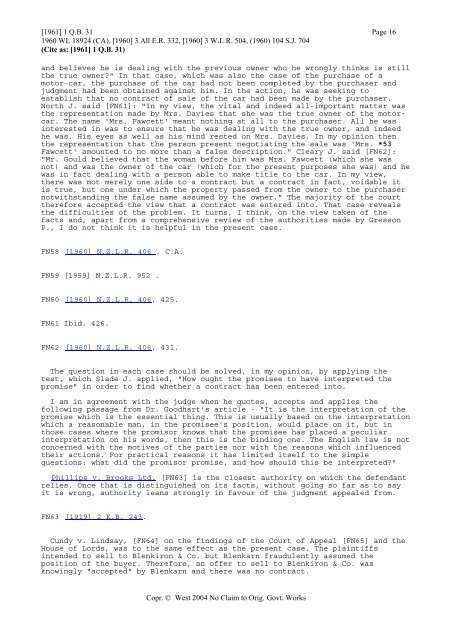Tesco v Constain - Thomson Reuters
Tesco v Constain - Thomson Reuters
Tesco v Constain - Thomson Reuters
You also want an ePaper? Increase the reach of your titles
YUMPU automatically turns print PDFs into web optimized ePapers that Google loves.
[1961] 1 Q.B. 31 Page 161960 WL 18924 (CA), [1960] 3 All E.R. 332, [1960] 3 W.L.R. 504, (1960) 104 S.J. 704(Cite as: [1961] 1 Q.B. 31)and believes he is dealing with the previous owner who he wrongly thinks is stillthe true owner?" In that case, which was also the case of the purchase of amotor-car, the purchase of the car had not been completed by the purchaser andjudgment had been obtained against him. In the action, he was seeking toestablish that no contract of sale of the car had been made by the purchaser.North J. said [FN61]: "In my view, the vital and indeed all-important matter wasthe representation made by Mrs. Davies that she was the true owner of the motorcar.The name 'Mrs. Fawcett' meant nothing at all to the purchaser. All he wasinterested in was to ensure that he was dealing with the true owner, and indeedhe was. His eyes as well as his mind rested on Mrs. Davies. In my opinion thenthe representation that the person present negotiating the sale was 'Mrs. *53Fawcett' amounted to no more than a false description." Cleary J. said [FN62]:"Mr. Gould believed that the woman before him was Mrs. Fawcett (which she wasnot) and was the owner of the car (which for the present purposes she was) and hewas in fact dealing with a person able to make title to the car. In my view,there was not merely one side to a contract but a contract in fact, voidable itis true, but one under which the property passed from the owner to the purchasernotwithstanding the false name assumed by the owner." The majority of the courttherefore accepted the view that a contract was entered into. That case revealsthe difficulties of the problem. It turns, I think, on the view taken of thefacts and, apart from a comprehensive review of the authorities made by GressonP., I do not think it is helpful in the present case.FN58 H[1960] N.Z.L.R. 406 , C.A.FN59 [1959] N.Z.L.R. 952 .FN60 H[1960] N.Z.L.R. 406, 425.FN61 Ibid. 426.FN62 H[1960] N.Z.L.R. 406, 431.The question in each case should be solved, in my opinion, by applying thetest, which Slade J. applied, "How ought the promisee to have interpreted thepromise" in order to find whether a contract has been entered into.I am in agreement with the judge when he quotes, accepts and applies thefollowing passage from Dr. Goodhart's article - "It is the interpretation of thepromise which is the essential thing. This is usually based on the interpretationwhich a reasonable man, in the promisee's position, would place on it, but inthose cases where the promisor knows that the promisee has placed a peculiarinterpretation on his words, then this is the binding one. The English law is notconcerned with the motives of the parties nor with the reasons which influencedtheir actions. For practical reasons it has limited itself to the simplequestions: what did the promisor promise, and how should this be interpreted?"HPhillips v. Brooks Ltd. [FN63] is the closest authority on which the defendantrelies. Once that is distinguished on its facts, without going so far as to sayit is wrong, authority leans strongly in favour of the judgment appealed from.FN63 H[1919] 2 K.B. 243.Cundy v. Lindsay, [FN64] on the findings of the Court of Appeal [FN65] and theHouse of Lords, was to the same effect as the present case. The plaintiffsintended to sell to Blenkiron & Co. but Blenkarn fraudulently assumed theposition of the buyer. Therefore, an offer to sell to Blenkiron & Co. wasknowingly "accepted" by Blenkarn and there was no contract.Copr. © West 2004 No Claim to Orig. Govt. Works
















